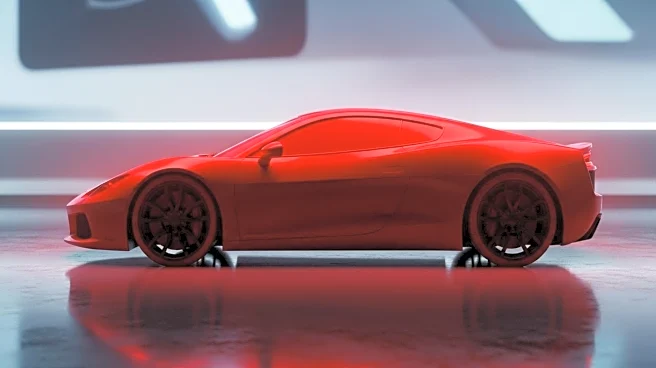What is the story about?
What's Happening?
Ferrari's shares fell by 15% following the announcement of its new long-term financial targets, which failed to meet market expectations. The luxury carmaker set a revenue target of 9 billion euros ($10.4 billion) for 2030, an increase from its forecast for this year, but less ambitious than anticipated. CEO Benedetto Vigna emphasized the importance of realistic targets during the presentation of the company's business plan to 2030. The unveiling of Ferrari's first electric car, the Elettrica, was overshadowed by the share price drop, which wiped 13.5 billion euros ($15.67 billion) from its market capitalization. Ferrari plans a 2030 lineup consisting of 40% internal combustion engine models, 40% hybrids, and 20% fully-electric vehicles, marking a shift from its previous plan.
Why It's Important?
The decline in Ferrari's share price highlights investor concerns over the company's ability to meet ambitious financial targets and adapt to the growing demand for electric vehicles. The shift in Ferrari's electrification strategy reflects broader industry challenges in transitioning from internal combustion engines to electric batteries. This development could impact Ferrari's competitive position in the luxury car market, where electrification is increasingly becoming a key differentiator. The company's revised targets may affect its market valuation and investor confidence, potentially influencing its future investment and innovation strategies.
What's Next?
Ferrari plans to launch an average of four new models per year between 2026 and 2030, aiming to maintain customer interest and expand its client base. The company will open new 'Tailor Made' centers in Tokyo and Los Angeles in 2027 to enhance customer engagement. Additionally, Ferrari intends to expand its lifestyle strategy with flagship stores in London and New York in 2026. These initiatives are part of Ferrari's efforts to strengthen its brand presence and adapt to changing market dynamics.
Beyond the Headlines
Ferrari's strategic shift towards electrification and lifestyle expansion reflects broader trends in the automotive industry, where luxury brands are increasingly focusing on sustainability and personalized customer experiences. The company's approach to electrification may influence its long-term brand identity and market positioning, as it navigates the balance between tradition and innovation.














